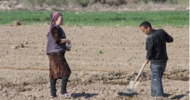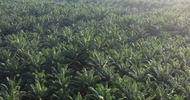Karuturi believes the potential for large profits is so great that it plans to invest nearly $1bn in its Ethiopian agricultural operations
- The Guardian
-
15 January 2010
Indian floriculture companies are moving into other agri-products in the world's second-largest continent.
- Business Today
-
21 July 2010
The Bodi people have been decimated since the Gibe III dam came into operation and diverted the Omo River’s waters to large-scale irrigation schemes.
- African Arguments
-
29 May 2024
Activists tracking these deals say rich countries are buying up land—93 million acres—and displacing local people and wildlife.
Unrest flared in Oromiya for several months until early this year over plans to allocate farmland surrounding the regional capital for development.
The three activists, who face terrorism charges for attempting to attend a workshop on food security, face a court hearing in Addis Ababa on October 22.
Ethiopian ambassador Mohammad Kabeera said his country has approved more than 361 investment projects to Saudi Arabia mainly in the agricultural sector.
- Arab News
-
07 December 2013
With attention centered on the civil war in the country over the last two years, the hunger and health crisis in the Omo Valley caused by the Gibe III Dam and the Kuraz Sugar Development Project has gone ignored.
- Oakland Institute
-
08 February 2023
Hamar pastoralists are being evicted to roadside villages without their consent, and their ancestral grazing lands are being sold off to investors for commercial plantations.
- Survival International
-
05 June 2015
The army's attack on indigenous communities is suspected to be directly related to a land grab in the area by the Turkish company Tekron Group.
When Gulf nations face food, security, and water scarcity issues, one response is to seek lucrative agricultural investments in fertile African lands. Yet, while such deals can bring benefits to the countries involved, there are also sizeable risks
Ethiopians do not need multinational food companies to improve their livelihood.
- Anyuak Media
-
24 November 2010
September 11: eight ethnic Majengir murdered by in cold blood by Ethiopian highlanders in Godere District, Gambela as tensions between settlers and indigenous peoples escalate.
- Anywaa Survival Organisation
-
18 September 2014
The science and environment author discusses a growing global threat
From the Middle East to Madagascar, high prices are spawning land grabs and ousting dictators. Welcome to the 21st-century food wars.
- Foreign Policy
-
27 April 2011
Forest regions and local livelihoods under threat as palm oil producers looking for new agricultural land are welcomed by African governments
The Government of Bangladesh has decided to acquire land in Sudan in a bid to explore commercial farming opportunities in the Northeast African country.
- Daily New Nation
-
17 September 2018
A new report published this week claims farmers in Africa are being driven off their traditional lands to make way for vast new industrial farming projects backed by European hedge funds seeking profits and foreign countries looking for cheap food.
The land grab phenomenon in Sudan...resembles a fata morgana, a mirage in the desert which completely distorts the object on which it is based
- OpEd News
-
12 October 2010
GCC countries face growing constraints in agricultural capacity. Structural factors are exacerbating pressures on food prices. A new report from Standard Chartered supports additional investment in agriculture.
- Business Intelligence Middle East
-
09 September 2008
The Chaco – which stretches across Argentina and Paraguay – is now being ripped up and converted to US-style ranchland by bulldozers even faster than it was before and the few Indians who live there have never felt more threatened, writes John Vidal
- The Guardian
-
08 July 2011
The terms of farmland deals are hardly made public. Although a theoretical possibility exists in a few cases for some transfer of technology for agricultural development, risk also exists to peasant farmers who cannot compete with well-resourced commercial farms. Take, for instance, the case of barley and oilseeds producers in Ethiopia.
- Abugida Info
-
13 August 2009
Ethiopia’s effort to resettle local farmers into main villages while also leasing land to foreign corporations or wealthy Ethiopians has put Gambella under scrutiny for charges of violent forced relocations.
One of the greatest threats Africa has ever faced is the impact from this new phenomenon of land-grabbing
- AllAfrica
-
21 September 2012
The World Food Program intends to buy some of the grain produced in Ethiopia by foreign investors in order to assist hungry people. Ironically, this group of intended food aid recipients will include those working to produce it in the first place. Ethiopia's government is calling this sustainable development.
The suffering of farmers in Ethiopia is going from worse to the worst as a result of inequitable land acquisitions, better called “neo-colonial land grabbing”, by foreign investors.
- Gadaa.com
-
11 February 2011
Birhanu Fikade of "The Reporter" sat down with Atkyelesh G.M. Persson (PhD) to learn about her findings on large scale FDI that failed to deliver the desired results in Ethiopia
- The Reporter
-
10 August 2019
Land has been the play-thing of centralising authoritarians throughout Ethiopia's recent history.
- openDemocracy
-
31 December 2011
An Ethiopian court has handed down a nine-year jail sentence to a leading dissident from the restive region where the government has leased vast tracts of land to foreign investors.
- Oakland Institute
-
02 May 2016















